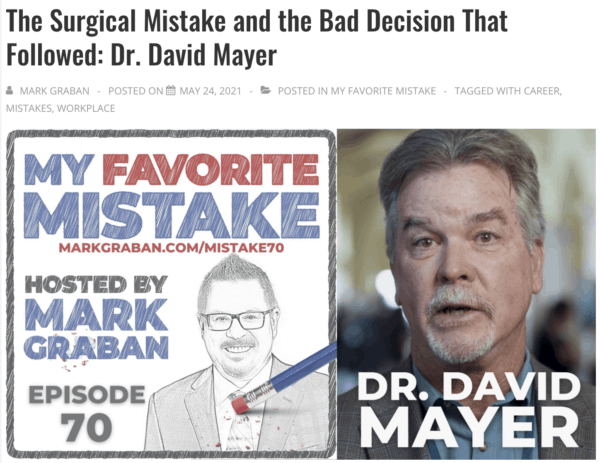I don't post every episode of the My Favorite Mistake podcast here, but my latest episode (#70) will have a strong appeal to readers of this blog.
This episode features Dr. David Mayer, who is an anesthesiologist and, among other things, the CEO of the Patient Safety Movement Foundation.
Click the image below for the episode page, where you can watch, listen, or read a transcript:

In the episode, Dr. Mayer tells a story from his residency about a surgeon cutting into the wrong side of a patient. That's human error — rather than demonizing that surgeon, we should think about the role of processes and systems and how we can error proof or prevent that from even being possible.
This type of error (what I call a “so-called never event”) still happens today, as we saw in the news recently, from Austria:
Man has wrong leg amputated in ‘tragic' hospital mix-up
“A disastrous combination of circumstances led to the patient's right leg being amputated instead of his left,” the hospital's statement said.
Another article about this case said:
“The error appears to have been made shortly before the operation, when the leg that was to be amputated was marked, the clinic said.”
Marking the surgical site is only effective if the process can ensure that the wrong side / site cannot be marked incorrectly.
The hospital:
“…was investigating what happened and would review its standards.”
Did they have insufficent standards or were the standards not being followed?
So anyway, back to the episode with Dr. Mayer. The human error on the part of surgeon was compounded by the CHOICE to lie to the patient about what happened. That deliberate action is far worse and would probably merit punishment if the lie were discovered by hospital leadership.
I don't blame Dr. Mayer for not speaking up. He was a resident, therefore low in the hierarchy. If there wasn't a culture of “psychological safety” that would have allowed him to speak up, I understand why he kept quiet in the moment.
But, I appreciate how Dr. Mayer was inspired by that incident — it's led him to do a lot of good in his career, working to improve systems and cultures in organizations.
Back to the surgeon… maybe there were extenuating circumstances that led to fatigue or being rushed. Maybe the surgeon didn't have the psychological safety to admit the error. Admitting the error, as tragic as it might be, allows us to then work together to improve the system so it cannot happen again.
Hiding, denying, or covering up the mistake means it's going to happen again, to somebody else.
What do you think? Do you have experiences like Dr. Mayer's?
I thank Dr. Mayer for having the discussion in this episode.
What do you think? Please scroll down (or click) to post a comment. Or please share the post with your thoughts on LinkedIn – and follow me or connect with me there.
Did you like this post? Make sure you don't miss a post or podcast — Subscribe to get notified about posts via email daily or weekly.
Check out my latest book, The Mistakes That Make Us: Cultivating a Culture of Learning and Innovation:









